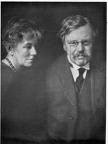Friday 27 January 2012
Fr Jay Scott Newman rejects natural justice, hearing the other side and fair play
And he simply will not recognise his own failure of charity and justice toward those who have a preference for the traditional Roman rite.
He shot his mouth off before the motu proprio of Pope Benedict XVI, Summorum Pontificum, came out claiming that it was "invisible" and predicting it would not come and then engaged in the usual cheap and insulting offensive against lovers of the traditional Roman rites that we have had to put up with for 40 years from people who ought to know better.
That was already unworthy.
But next, he would tolerate no attempt to put the alternative view. He simply censored out any comment critical of his position by blanking it from his blog or website.
Father Newman recently apologised for his comments that those voting for President Obama should repent before taking communion. But, folks, you can be sure he won't be apologising any time soon for his offensive comments against lovers of the traditional Roman rites.
Well, Father, you can fool your readers but you cannot fool God.
...
Thursday 26 January 2012
More ammo for trads - all from the Saints, Doctors and Magisterium of the Church
Here's the ammo, trads...
St Thomas Aquinas
“It is absurd, and a detestable shame, that we should suffer those traditions to be changed which we have received from the fathers of old." - The Decretals (Dist. xii, 5) Cited by St Thomas Aquinas in the Summa Theologica, II, I, Q. 97, art. 2.
"'One faith,' St. Paul writes (Eph. 4:5). Hold most firmly that our faith is identical with that of the ancients. Deny this, and you dissolve the unity of the Church ... We must hold this for certain, namely: that the faith of the people at the present day is one with the faith of the people in past centuries. Were this not true, then we would be in a different church than they were in and, literally, the Church would not be One."
St Irenaeus
"As I said before, the Church, having received this preaching and this faith, although she is disseminated throughout the whole world, yet guarded it, as if she occupied but one house. She likewise believes these things just as if she had but one soul and one and the same heart; and harmoniously she proclaims them and teaches them and hands them down, as if she possessed but one mouth. For, while the languages of the world are diverse, nevertheless, the authority of the tradition is one and the same" – St Irenaeus, Against Heresies, 1:10:2, 189 AD.
St Jerome
“The best advice that I can give you is this. Church traditions – especially when they do not run counter to the Faith – are to be observed in the form in which previous generations have handed them down.” - St Jerome, Letters, 71, 6. (4th Century).
Origen
"Although there are many who believe that they themselves hold to the teachings of Christ, there are yet some among them who think differently from their predecessors. The teaching of the Church has indeed been handed down through an order of succession from the apostles and remains in the churches even to the present time. That alone is to be believed as the truth which is in no way at variance with ecclesiastical and apostolic tradition" – Origen, The Fundamental Doctrines, 1:2, 225 AD.
Pope St Leo the Great
"Teach nothing new, but implant in the hearts of everyone those things which the fathers of venerable memory taught with a uniform preaching ... Whence, we preach nothing except what we have received from our forefathers. In all things, therefore, both in the rule of faith in the observance of discipline, let the pattern of antiquity be observed." - Pope St Leo the Great, Father and Doctor of the Church.
Pope Leo XIII
"They knew only too well the intimate bond which unites faith with worship, 'the law of belief with the law of prayer,' and so, under the pretext of restoring it to its primitive form, they corrupted the order of the liturgy in many respects to adapt it to the errors of the Innovators." - Pope Leo XIII, Apostolicae Curae, September 13, 1896.
Pope St Pius X
"But for Catholics nothing will remove the authority of the second Council of Nicea, where it condemns those 'who dare, after the impious fashion of heretics, to deride the ecclesiastical traditions, to invent novelties of some kind . . . or endeavour by malice or craft to overthrow any one of the legitimate traditions of the Catholic Church'. . . . Wherefore the Roman Pontiffs, Pius IV and Pius IX, ordered the insertion in the profession of faith of the following declaration: 'I most firmly admit and embrace the apostolic and ecclesiastical traditions and other observances and constitutions of the Church'.” - Pope St Pius X, Pascendi Dominici Gregis (Encyclical Against Modernism.
"The true friends of the people are neither revolutionaries nor innovators, but traditionalists." - Pope St Pius X, Notre Charge Apostolique.
Second Council of Nicea (Seventh Ecumenical Council)
"If anyone rejects any written or unwritten tradition of the Church, let him be anathema."
"Let everything that conflicts with ecclesiastical tradition and teaching, and that has been innovated and done contrary to the examples outlined by the saints and the venerable Fathers, or that shall hereafter at any time be done in such a fashion, be anathema."
Pope Pius XII
"The day the Church abandons Her universal tongue will be the day before She returns to the Catacombs." - Pope Pius XII (a few days before his death).
Pope Paul VI
"We would warn against the danger and damage of the blind rejection of the inheritance which the past, through a wise and selective tradition, transmits to new generations. If we did not hold this transmission in proper regard we could lose the treasure accrued by civilization.” - October 29, 1972.
St Augustine
"But in regard to those observances which we carefully attend and which the whole world keeps, and which derive not from Scripture but from Tradition, we are given to understand that they are recommended and ordained to be kept, either by the apostles themselves or by plenary [ecumenical] councils, the authority of which is vital to the Church.” – St Augustine, Letter to Januarius, 400 AD.
St Simeon of Thessalonica
"With love, we pass on to you that which we have taken from the Fathers, for we offer nothing new, but only that which has been passed on to us, and we have changed nothing but we have retained everything, like a creed, in the state in which it has been given to us. We worship exactly as Christ Himself did and as did the Apostles and the Fathers of the Church." - St Simeon of Thessalonica, in Migne, Patrologia Graeca, 155:701 a-b.
St Isidore
"Therefore, heresy is from the Greek word meaning 'choice' . . . . But we are not permitted to believe whatever we choose, nor to choose whatever someone else has believed. We have the Apostles of God as authorities, who did not . . . choose what they would believe but faithfully transmitted the teachings of Christ. So, even if an angel from heaven should preach otherwise, he shall be called anathema. - St Isidore, Doctor of the Church and last of the great Latin Fathers, Etymologies, 7th Century.
St Athanasius
"You are fortunate, you have remained in the Church through your faith. You held fast to the foundations of the faith which has come down to you from Apostolic Tradition. . . .In the present crisis, it is they who have broken away from it." - St Athanasius, Doctor of the Church, died 373 AD.
"But you are blessed, who by faith are in the Church, dwell upon the foundations of the faith, and have full satisfaction, even the highest degree of faith which remains among you unshaken. For it has come down to you from apostolic tradition, and frequently accursed envy has wished to unsettle it, but has not been able" – St Athanasius, Festal Letters 29, 330 AD.
St Vincent of Lerins
"What then shall the Catholic do if some portion of the Church detaches itself from communion of the universal Faith? What other choice can he make -- and if some new contagion attempts to poison, no longer a small part of the Church, but the whole Church at once, then his great concern will be to attach himself to antiquity (Tradition) which can no longer be led astray by any lying novelty."
"The Church of Christ, zealous and cautious guardian of the dogmas deposited with it, never changes any phrase of them. It does not diminish them or add to them; it neither trims what seems necessary now grafts things superfluous . . . but it devotes all its diligence to one aim: To treat tradition faithfully and wisely; to consolidate and to strengthen what already was clear; and to guard what already was confirmed and defined." - St Vincent of Lerins, Commonitoria (5th Century).
“With great zeal and closest attention, therefore, I frequently inquired of many men, eminent for their holiness and doctrine, how I might, in a concise and, so to speak, general and ordinary way, distinguish the truth of the Catholic faith from the falsehood of heretical depravity. I received almost always the same answer from all of them—that if I or anyone else wanted to expose the frauds and escape the snares of the heretics who rise up, and to remain intact and in sound faith, it would be necessary, with the help of the Lord, to fortify that faith in a twofold manner: first, of course, by the authority of divine law [Scripture] and then by the tradition of the Catholic Church.” – St Vincent of Lerins, The Notebooks, 434 AD.
Blessed John Henry, Cardinal Newman
"It is quite evident that this passage furnishes no argument whatever that the sacred Scripture, without Tradition, is the sole rule of faith; for, although sacred Scripture is profitable for these four ends, still it is not said to be sufficient. The Apostle [Paul] requires the aid of Tradition (2 Thess. 2:15). Moreover, the Apostle here refers to the scriptures which Timothy was taught in his infancy.”
St Peter Canisius
"Better that only a few Catholics should be left, staunch and sincere in their religion, than that they should, remaining many, desire as it were, to be in collusion with the Church's enemies and in conformity with the open foes of our faith." - St Peter Canisius (1521-1597)
“It behoves us unanimously and inviolably to observe the ecclesiastical traditions, whether codified or simply retained by the customary practice of the Church.” – St Peter Canisius (1521-1597)
What could be clearer? Abandon tradition at your spiritual peril...
...
Summorum Pontificum 5 years on: have the detractors like Fr Jay Scott Newman apologised?
That is, I suggest, is a little ungracious.
It may be instructive to repeat now what I said then, in August 2007, on the Roman Christendom blog.
Here it is repeated:
...
“Before the motu proprio was issued Fr Jay joined in with the 'Latin Questions' discussion on his blog and made this unhelpful comment:
"...The long-rumored and still invisible motu proprio notwithstanding, there is simply no interest in the Church beyond the statistically insignificant world of specialists and bloggers in retrieving what 99.999% of the Catholic people (and hierarchy) consider a noble part of our heritage but not a living part of our future (think of the papal navy!)..."
Where does he get his stats? Wake up and smell the coffee, Father!
And this:
"...All of which leads to my conclusion that those who harbor hope that the general liturgical life of the Church will be improved by a few more celebrations of the Pian Mass have simply and profoundly misunderstood the situation of the Church in our time..."
Yep. Pretty offensive and ill-informed stuff. It's not the Pian mass. It is much, much older. He has simply 'profoundly misunderstood'!
Someone replied to him thus:
'Your over-emphasis on numbers might lead an observer to think that you put a higher premium on popularity than truth or right practice...
If you want to get with what is 'serious' then you need to concern yourself less with numbers and more with truth and tradition.
Otherwise you may find yourself numbered with those disciples who got with the numbers by running away, rather than with those who stood at the foot of the Cross.
I know it is difficult for a priest these days to give any favour to the traditional rite without incurring trouble with his bishop but do not let that skew your vision or compromise your intellectual impartiality.'
He got cross with that and replied:
'...Based on 20 years of experience, I believe that such folk will be sadly disappointed, no matter what the yet-to-be published (or even seen) motu proprio may or may not say...'
Someone replied to him beginning:
'I catch a glimpse of a straw man in your last comment...'
Well, indeed!
There were other replies to Fr Newman but - mysteriously - they were removed from his blog.
US-style "free speech"?
See how it works?
I am free to say whatever I like but if you say something I don't like, I just erase it.
This is called "free speech". Apparently!
But then, all of a sudden, and within only a few weeks, out came the motu proprio.
Whoops! Now the boot was on the other foot. The 'long-rumoured and yet invisible' and the 'yet to be published (or even seen)' had suddenly been seen, published and hugely exceeded the expected minimalist concessions that unnecessarily aggressive Novus Ordo priests like Fr Jay had expected.
And it came from the Pope himself!
Golly! What to do, now? Um, err, aaah....
You guessed it - back-peddle. Fast! (But without apologising to anyone - never apologise, never explain, apparently!).
Here's an extract from Fr Jay's very grudging back-peddle:
'In any event, last Saturday, Pope Benedict XVI threw a spanner in the works with his long-awaited, much-rumored, and oft-debated Apostolic Letter Summorum Pontificum, which more or less (kinda, sorta) gives any priest of the Latin Rite the choice of which Mass to offer: the Mass codified by Pope Pius V after the Council of Trent or the Mass codified by Pope Paul VI after the Second Vatican Council. It remains to be seen what effect, if any, this document will have on the life of the Church as it is lived in parishes, religious houses, seminaries, etc...'
Get that, folks? The Pope 'threw a spanner in the works'.
The Pope did it!
And this from a priest who thinks himself a papal loyalist. And Paul VI apparently only 'codified' the new mass - no new Eucharistic prayers or anything like that...err...
But let's read on:
'In February 1962, Pope John XXIII promulgated an Apostolic Constitution called Veterum Sapientia, mandating very specific requirements for the teaching and preservation of Latin in the Church, but because of the radical changes taking place in the world at the time, this authoritative document was Dead On Arrival and had zero effect in the life of the Church. Today, if this document is read at all, it is usually read with mirth. Well might we all mourn the passing away of Latin from wide use in the Church, but pass away it has....'
Oh really?
So we should rejoice in our ignorance of our own history, culture and the language in which most of our theology is written, should we? We should think it's all 'DOA'? And we should read 'with mirth' the writings of a beatified pope, should we?
More papal loyalism? Err, sorry Father, I don't think so!
But there's more...
'Will Summorum Pontificum be DOA in the same way as Veterum Sapientia? I honestly don’t know, and to tell the truth, I don’t much care one way or the other...'
'Don't much care...'!
Does this sound like loyalty to the Pope? I doubt that many would see it that way!
So whilst Fr Jay has been forced to back off he has done so with singularly bad grace. That is a great shame because he is a priest who made much of his loyalty under Pope John Paul II but is acting rather differently under Pope Benedict. But even more so because he is not a bad guy. Indeed, he is basically a good guy but he has allowed his thinking and theology to get sloppy and complacent.
Come on now, Fr Jay. You're basically a good priest but you can do better. Don't cheat yourself or your parishioners!"
...
Fr Jay for a long time refused to receive any further comments on his blog. He clearly wanted it all just to go away. Of course, burying your head in the sand like that does no-one any good.
His penultimate post was, aptly but sadly, entitled "Liturgy Wars". But the simple truth is that it was not traditional-rite Catholics who started the war. It was anti-traditionalists who started it.
There should, of course, be no wars over liturgy. We should all be on the same side, not divided internally.
Unfortunately, it is the kind of statement that appeared in Fr Jay's Parish newsletter that can sometimes tend to prolong the war. I publish it below as it is in the public domain and a commentator has sent it to me.
If any priest is going to claim to be loyal to the Pope and to say "Where Peter is, there is the Church", then he needs to be open and willing to implement the motu proprio, and should avoid minimising it by suggesting that it "kinda, sorta" gives wider permission for the traditional rites.
The reality is that the motu proprio gives extremely wide and extensive permission for the use of the traditional rites.
But here is Fr Jay's advice to his parishioners on 1 July 2007, just before the publication of the motu proprio:
"When this document is finally published, there will no doubt be a circus of media attention of the most sensational kind, but please do not be confused or disturbed by what you read in the papers or see on television. Whatever else may be the case, there will certainly be no changes made in the present way we celebrate the Missal of 1970 in our scheduled liturgies, and pending a careful study of the document, I do not anticipate that a regularly scheduled Tridentine Mass will be celebrated here at St. Mary’s. For now, simply know that a document will probably appear this summer, and when it does, we will study it together."
To be fair to Fr Jay, he clearly did not anticipate the breadth and width of the rights granted by the motu proprio and, I suspect, is still slightly in denial about it all. On his blog, he certainly admits to being a bit confused by it all.
I had hoped that when he had had time to digest it all, reflect upon it all and pray about it, he would take a more balanced view.
No sign, I’m afraid.
He remains, it seems, stuck in his arrogance toward those whose only “fault” is to want to preserve the traditions of prayer of the Roman Catholic faith.
I also wrote this then which I believe is still apposite:
...
“I cannot help recalling that Cardinal James Knox, when he was still alive, brutally and carelessly ordered a forward altar and mass versus populum at the Chiesa Nuova in Rome despite the strong opposition of the protectress of the Church, Princess Borghese, and the strong feelings of the Faithful, not to mention the Fathers (they are Oratorians).
This was all too typical of those times - brutal, senseless, unjust and uncharitable actions were all too common in liturgical matters. That is partly why Pope John Paul II felt it necessary to apologise for them in 1988 and after, and the present pope likewise in Summorum Pontificum.
Too many of those with authority rode roughshod over the deeply-held traditions, and religious beliefs and sensibilities of all too many of the Faithful without a word of apology or sympathy.
Those of the Faithful who had been deeply loyal and loved the Church to the uttermost, politely asked if they could worship as they always had and were brushed aside like so much chaff. Heedless of age, sex or sensibility, decent and humble people were arrogantly treated.
No wonder so many people left the Church!
The sheep looked up to be fed and what happened?
They were clouted on their snouts even by their own shepherds!
It was particularly odious to witness the ill-treatment of elderly people who often had the greatest difficulty adapting to the liturgical changes. What did this behaviour say about the attitude that Christians should have to old people?
Personally, I think it added to the general decline in proper behaviour toward the elderly in our society. It was a scandalous bad example.
Thank God we have had two popes who finally understood and sympathised with the Faithful who have been so bruised, battered, scandalised and horrified by the senseless uncharity of so many of those in authority in relation to liturgical issues in the recent past.
Still, there are too many who, whilst abusing and insulting those whose tastes are for the traditional, nevertheless accuse them of being sour, cross and abusive.
They never seem to stop and think about the insults, calumnies, detractions and abuse that the Faithful who love the traditions of the Church have had to put up with over the recent past.
If, as the calumniators claim, the Faithful who love the traditions of the Church are but a small number of disaffected people, then why abuse and insult them?"
...
In fact, of course, the traditional movement is now inundated with youngsters. The movement Juventutem is but one example of many new traditional youth movements filled with youngsters who want the authentic and ancient Catholic tradition, not mere pap and pope music from the 1960s.
I say to all priests your loyalty should be primarily to JESUS CHRIST and the long traditions of His Church. If you abandon the past then you abandon the present also, for, as St Thomas Aquinas teaches us:
“It is absurd, and a detestable shame, that we should suffer those traditions to be changed which we have received from the fathers of old"
To do so is to follow the traditions of men, not the traditions of God, something St Paul expressly warned us against:
"Therefore, brethren, stand fast; and hold the traditions which you have learned, whether by word, or by our epistle"
"Now I praise you, brethren, that in all things you are mindful of me: and keep the traditions as I have delivered them to you."
So, my dear Fathers. Don’t dissemble, dissent or detract but, instead, keep the traditions handed on from of old. That is your noble task. Be worthy of it.
Saturday 7 January 2012
The Feast of the Three Kings - the Theophany or manifestation of the Lord to the Gentiles
The Feast of the Three Kings or Magi
"When Jesus therefore was born in Bethlehem of Juda, in the days of king Herod, behold, there came wise men from the East to Jerusalem, saying: where is he that is born king of the Jews? For we have seen his star in the East, and are come to adore him. And king Herod hearing this, was troubled, and all Jerusalem with him. And assembling together all the chief priests and the scribes of the people, he inquired of them where Christ should be born. But they said to him: In Bethlehem of Juda. For so it is written by the prophet: and thou Bethlehem the land of Juda art not the least among the princes of Juda: for out of thee shall come forth the captain that shall rule my people Israel.
Then Herod, privately calling the wise men learned diligently of them the time of the star which appeared to them; and sending them into Bethlehem, said: go and diligently inquire after the child, and when you have found him, bring me word again, that I also may come and adore him. Who having heard the king, went their way; and behold the star which they had seen in the East, went before them, until it came and stood over where the child was. And seeing the star they rejoiced with exceeding great joy. And entering into the house, they found the child with Mary his mother, and falling down they adored him: and opening their treasures, they offered him gifts; gold, frankincense, and myrrh. And having received an answer in sleep that they should not return to Herod, they went back another way into their country."
[Matt 2:12 - Gospel for the Mass of the Epiphany]
The Shrine of the Three Kings in Cologne Cathedral contains their relics brought from Milan by ship to the City of Cologne on the order of the Holy Roman Emperor, Frederick Barbarossa, in 1164 as a gift to the Prince-Elector Archbishop, Rainald of Dassel.
This gave rise to the English Carol "I Saw Three Ships Come Sailing in".
The relics had first been taken from Constantinople to Milan in 344 by Bishop Eustorgius of Milan.
Around 1199, the Roman Emperor Otto IV gave three golden crowns made for the three wise men as a present to the church of Cologne, the city where, the previous year, he had been elected King of the Romans and Emperor-elect by the Prince-Electors of the Empire (he later gained the support of all the imperial princes at Frankfurt in 1208).
An inscription reads:
Otto rex coloniensis curiam celebrans tres coronas de auro capitibus trium magorum imposuit.
Otto the King, the court of Cologne celebrating, gave three golden crowns for the heads of the three Magi.
Emperor Otto IV was the only member of the Welf dynasty to be elected Holy Roman Emperor and, being the son of Matilda Plantagenet (married to Henry the Lion, Duke of Bavaria), he was allied to England in the Franco-English wars. He was also the personal preference of Pope Innocent III, who crowned him Roman Emperor at Rome in 1209, although they later fell out over the issue of the imperial rights in Italy.
Because of the importance of the shrine and the cathedral for the later development of the city, the Coat of Arms of Cologne still shows these three crowns symbolizing the Three Kings.
Construction of the present Cologne Cathedral was begun in 1248 to house these important relics. The cathedral took 632 years to complete and is now the largest Gothic church in northern Europe.
On July 20th, 1864, the shrine was opened, and the remains of the three Kings and the coins of Philipp von Heinsberg, Archbishop of Cologne, were discovered.
An eyewitness report reads:
“In a special compartment of the shrine now there showed - along with remains of ancient old rotten or moulded bandages, most likely byssus, besides pieces of aromatic resins and similar substances - numerous bones of three persons, which under the guidance of several present experts could be assembled into nearly complete bodies: the one in his early youth, the second in his early manhood, the third was rather aged. Two coins, bracteates made of silver and only one side striken, were adjoined; one, provably from the days of Philipp von Heinsberg, displayed a church, the other showed a cross, accompanied by the sword of jurisdiction, and the crozier on either side.”
The bones were wrapped in white silk and returned to the shrine where they remain to this day to be venerated by all the Faithful.
By long tradition, on the Feast of the Epiphany – called Dreikoenigsfest (the Feast of the Three Kings) in the lands of the old Holy Roman Empire – the Rector of the Parish (or in his absence, the father of each family) visits each house with a cross-bearer, 2 acolytes and 3 children dressed as the kings, one bearing a censer with lighted incense. At each house a little ceremony takes place, the house is blessed with Epiphany water, and over the door lintel of the house the following is inscribed with blessed chalk:
20 + C + M + B + 12
In my house we always perform this traditional ceremony.
This symbolises the present year and the blessing of the three Magi, Caspar, Melchior and Balthazar, upon each home.
The symbols remain all year or until the weather has washed them away.
+
The Journey of the Magi
by T S Eliot
A cold coming we had of it,
Just the worst time of the year
For a journey, and such a long journey:
The ways deep and the weather sharp,
The very dead of winter.
And the camels galled, sore-footed, refractory,
Lying down in the melting snow.
There were times when we regretted
The summer palaces on slopes, the terraces,
And the silken girls bringing sherbet.
Then the camel men cursing and grumbling
And running away, and wanting their liquor and women,
And the night-fires going out, and the lack of shelters,
And the cities dirty and the towns unfriendly
And the villages dirty and charging high prices:
A hard time we had of it.
At the end we preferred to travel all night,
Sleeping in snatches,
With the voices singing in our ears, saying
That this was all folly.
Then at dawn we came down to a temperate valley,
Wet, below the snow line, smelling of vegetation;
With a running stream and a water mill beating the darkness,
And three trees on the low sky,
And an old white horse galloped away in the meadow.
Then we came to a tavern with vine-leaves over the lintel,
Six hands at an open door dicing for pieces of silver,
And feet kicking the empty wineskins.
But there was no information, and so we continued
And arrived at evening, not a moment too soon
Finding the place; it was (you may say) satisfactory.
All this was a long time ago, I remember,
And I would do it again, but set down
This set down
This: were we led all that way for
Birth or Death? There was a Birth, certainly,
We had evidence and no doubt. I had seen birth and death,
But had thought they were different; this Birth was
Hard and bitter agony for us, like Death, our death.
We returned to our places, these Kingdoms,
But no longer at ease here, in the old dispensation,
With an alien people clutching their gods.
I should be glad of another death.
+ + +
"three trees on the low sky... I should be glad of another death."
...






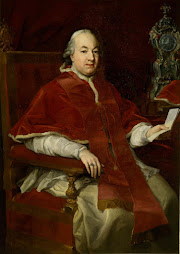

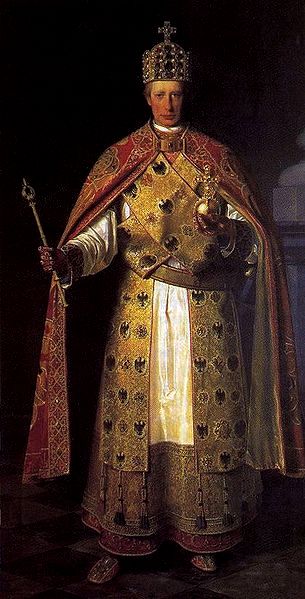




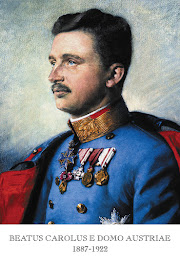

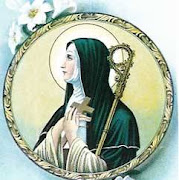


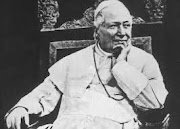
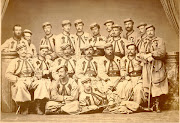
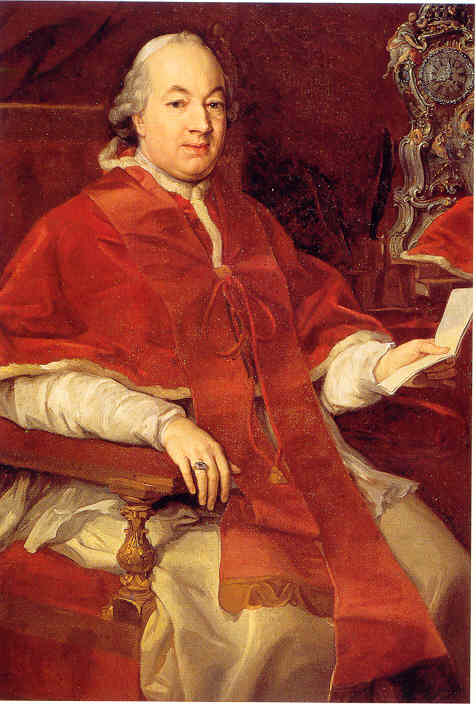
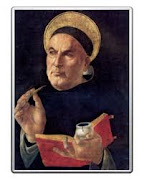



_-002.jpg/220px-Circle_of_Anton_Raphael_Mengs,_Henry_Benedict_Maria_Clement_Stuart,_Cardinal_York_(ca_1750)_-002.jpg)
